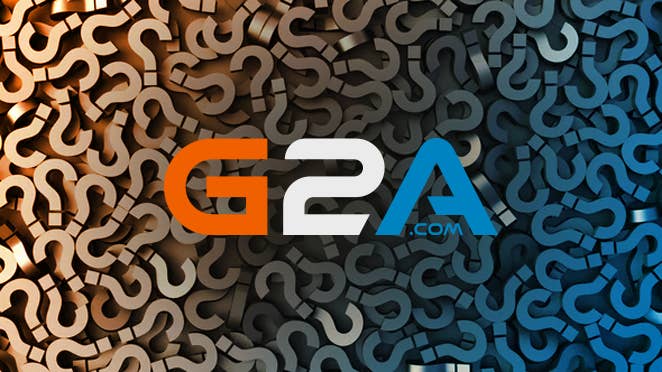G2A: "We want to finally stop the accusations"
Divisive marketplace addresses developer complaints after indies called for players to pirate games rather than purchase from G2A
Earlier this week, G2A once again came under fire from indie developers and publishers for selling stolen keys but insists this is not the case.
The backlash was triggered by a tweet from Mike Rose, who complained about G2A's sponsored ads on Google for Rage Squid's Descenders, published by Rose's firm No More Robots.
He said he would rather players pirate the game than buy from the controversial marketplace, since "devs don't see a penny either way" -- a claim supported by other indie developers such as Vlambeer's Rami Ismail.
GamesIndustry.biz reached out to G2A for their response, and the company responded with a lengthy breakdown of its business model, misunderstandings on how it operates, and what G2A is doing to address these accusations.
"We are and always were open for discussion, but a real one, not empty accusations and catchy slogans"
It stressed that, contrary to the frequent accusations it receives, G2A's business model is "the same as any other big global marketplaces' like Amazon or eBay, with all its ups and down." And, like many online businesses, G2A uses automated marketing like Google Ads to promote products around what users may be interested in.
The company also emphasised it's not the only place where people can sell game keys, although it is the biggest. But if G2A were to shut down, "selling game keys wouldn't disappear."
"If any developer suspects there are keys on the marketplace that shouldn't be there, there's a quick and easy way to report it," the firm wrote. "All it takes is to contact us. If any key was illegally obtained, we'll remove it, block the seller and provide their personal data to the proper authorities.
"We are and always were open for discussion, but a real one, not empty accusations and catchy slogans."
It later added the indies who tweeted around this issue, including Rose, have not contacted G2A. However, Rose has since tweeted that he did, and started a petition demanding G2A drop all indie games from its marketplace.
It claims that Microsoft did so after thousands of its own keys were leaked, but less than 20 were found on G2A's marketplace.
"We can assume the reason [these indies] wrote those posts was to gain media attention. Unfortunately for G2A, they were incredibly successful: their tweets caused an avalanche of articles."
G2A reports that around one million games are sold every month on its marketplace. It also says only 1% of all transactions are problematic and all of these are handled by the support team contacting the seller.
60% of issues (0.6% in total) concern payment problems, such as cards being declined. 30% (0.3%) are unrelated to the marketplace, such as mistaken purchases or people not liking the game they bought. 8% (0.08%) are keys not working, due to typos, etc. And 2% (00.2%) are because the title users purchased through G2A disappeared from their Steam account for various reasons, such as chargeback.
Only 8% of all titles sold each month on G2A are indie games.

Looking specifically at Descenders, the company cites SteamSpy's estimation of 32,000 sales since launch (in the absence of official sales figures) and notes that since its full release in May, only five keys have been sold via G2A.
A further 226 were sold while the game was still in Early Access, meaning 0.72% of the estimated 32,000 copies were sold through G2A's marketplace.
"What does this mean? Two things," the company wrote. "No More Robots is pretty good at handling the keys they don't want available on the free market. [And] G2A has no significant impact on No More Robots' business."
It also denies Rose's accusations that it made its Google Ads unblockable "simply because that is impossible."
The retailer then went into depth on how keys are obtained before they come to G2A, stressing that the "overwhelming majority" are sold by wholesalers who buy directly from developers and publishers. It also emphasised the challenges of validating every key sold through its marketplace.
"We're not doing this because we're the ones to blame, but because we want to finally stop the accusations we've been getting from some devs"
"If you go and sell a bike on eBay, they don't check if you actually have that bike in your home. They can't check if the bike is working, if the colour is right, etc. What the platform checks is who you are, meaning it gathers your personal data and payment information, which, if need be, can be given to proper authorities.
"It also provides a system that allows people who buy a bike from you to rate the transaction. A good marketplace also guarantees a successful purchase and offers its buyers a refund if something goes wrong - for free, of course. And so does G2A with its Money-Back Guarantee.
"What G2A cannot do is inspect every single key and check whether it will work or not. Not because we don't want to, but because it's technically impossible (once 'checked', the key becomes activated). We would love Steam to implement such a feature, since it would contribute a lot to the greater good."
G2A also often faces accusations that keys sold through its marketplace are purchased legally but via stolen credit cards. The company broke down why this is "quite impossible for the average Joe", and that indie games aren't sold quickly enough on G2A to indicate someone is 'cashing out' the theft of a credit card before it gets blocked.
"There's always a small risk that this may happen. The developer is not the only victim here. G2A also is, since it means our users would lose games, which we'd then have to refund.
"Secondly, G2A's role is to do everything possible to prevent and punish such activities. That's why we have an extensive rating system on our site, as well as strict AML/KYC procedures for our sellers, so that we know exactly who they are."
G2A also suggested various other means through which users can obtain keys to sell through its marketplace, such as posing as influencers and asking for free keys from the developer.
"These situations are not common, but we fully understand the annoyance of developers and we are willing to help put an end to such practices, at least on our marketplace."
It notes that many developers "give out thousands of free keys on social media" and warns that this counts as a legal acquisition on the user's part, enabling them to be sold on G2A.
"This is how it works - if I get something in a competition or in a giveaway, this product is mine, and I can do anything I want with it. I can use it, I can gift it to a friend, I can sell it - anything goes. This is the very core principle of the free market."
Furthermore, the company promised to "pay developers ten times the money they lost" on chargebacks for illegally obtained keys sold via G2A, providing studios can prove this happened through their stores.
G2A will hire a "reputable and independent auditing company" to ensure a transparent process. The auditors will examine both developer's own stores and the G2A marketplace, checking whether any keys sold via G2A were acquired from developers using a stolen credit card. If they have, G2A will pay ten times the money lost.
"We want this process to be transparent, so we will publicly report every step of the procedure. Meaning, you will get information such as who came forward, and what the verdict was, all of which will be published for everyone to see."
The company ends by acknowledging its past faults -- most notably "the infamous G2A Shield, our biggest screw-up," which has since been replaced by the free money-back guarantee.
"We understand that not everyone may want to believe us and that's why we will pay all the developers who can prove they lost money on chargebacks. We're offering ten times more than what they lost.
"We're not doing this because we're the ones to blame, but because we want to finally stop the accusations we've been getting from some devs. The alleged frauds didn't happen in our ecosystem, but on their own stores. Thieves could've sold these keys anywhere. But if they chose G2A, we're ready to make up for it."

